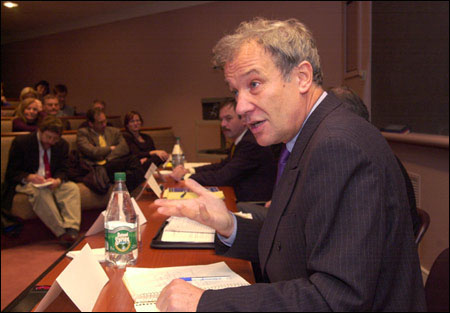Expansion to bring energy to European Union:
Eastern European ambassadors discuss topic at Center for European Studies

The coming expansion of the European Union to include 10 Eastern and Central European countries will fulfill an age-old dream of European unification and add vitality and energy to the organization, the ambassadors of four candidate nations said last week.
The ambassadors to the United States from Hungary, the Czech Republic, Poland, and Slovakia discussed the coming expansion of the European Union (EU) – which is expected to be finalized by 2004 – during a panel talk at the Minda de Gunzburg Center for European Studies Thursday (Nov. 14).
The event, held before a similar discussion at the Kennedy School of Government Thursday evening, came on the heels of recent events that have cleared the way for the long-awaited expansion, according to Professor of Government Grzegorz Ekiert, who moderated the talk.
“Great and exciting things are going on in Europe,” Ekiert said. “The European Commission is confident that enlargement will happen. It’s about time. Central and Eastern European countries have waited too long for this development.”
In October, Irish voters ratified the Treaty of Nice, which allows for EU enlargement and cleared the way for EU member countries to meet to discuss the sticky issue of financing the enlargement.
Difficult though that issue was, European Union leaders reached agreement later that month on how to pay for enlargement during a two-day summit in Brussels. Final negotiations will be held in December with the 10 countries eligible for membership in the 15-nation bloc. The 10 countries seeking EU membership are Cyprus, the Czech Republic, Estonia, Hungary, Latvia, Lithuania, Malta, Poland, Slovakia, and Slovenia.
The EU got its start in the 1950s with six countries cooperating on coal and steel production in an effort to collectively control the raw materials of war. Candidate nations have been added four times since then even as the level of economic and political cooperation among members has increased. EU nations established a common economic market in 1993 and, in January 2002, established a common currency, the euro, as legal tender in 12 EU nations.
The ambassadors at the Center for European Studies’ discussion talked about a variety of issues facing their nations but were unanimous in stating that they expect their countries to not just benefit from EU membership, but to also add vitality and energy to the EU.
“We have come to these institutions [the EU and NATO] not as liabilities, but as assets,” said Polish Ambassador Przemyslaw Grudzinski.
Grudzinski said Poland has traveled a long road since 25 years ago, when as a Soviet bloc country, membership in NATO, which Poland achieved in 1999, and in the EU were seemingly unreachable goals.
“Poland has experienced a roller-coaster ride over the last 25 years. From that perspective, what has been achieved is remarkable,” Grudszinski said.
Several ambassadors reflected that enlargement is proceeding despite today’s slow economy. And, though the economic times might not be ideal for enlargement, the political momentum cannot be slowed.
“It is going to occur when candidate countries and the European Union are not 100 percent prepared for it. But there’s political momentum towards it and because of this political momentum it’s going to occur,” said Slovakia’s Ambassador Martin Butora.
Grudzinski said expansion might well be the event that helps boost European economies.
“New countries bring new energy and enthusiasm,” Grudzinski said. “If we can restore some sort of a smile to Europe we will have achieved at least part of what we want to achieve.”
Some of the ambassadors predicted that an enlarged EU will finally gain parity with the United States on the international stage. Hungarian Ambassador Andras Simonyi, said the EU missed the opportunity to do so earlier by making the candidate nations wait so long after the breakup of the Soviet bloc.
Simonyi said the problems facing the Western world are shared by Europe and the United States: terrorism, the challenges of technological growth, the economy, and many other problems.
“There’s no alternative to trans-Atlantic relations. This will not mean less America, it will mean more Europe,” Simonyi said. “Europe and the U.S. will be the two pillars that provide stability.”
Simonyi said joining the European Union is important to Hungary. One hundred and fifty years ago, he said, Hungary was more a part of Europe than 50 or 25 years ago. EU membership will correct that.
“It’s just natural that Hungary … is returning to where it belongs,” Simonyi said. “It was a hard road and we’re really proud.”




